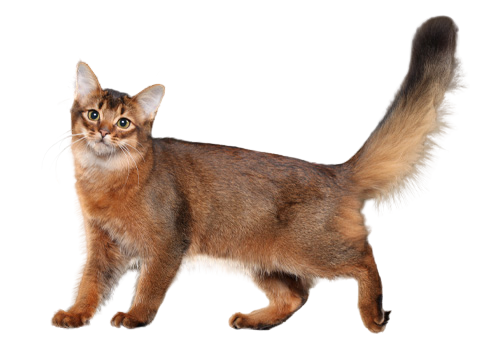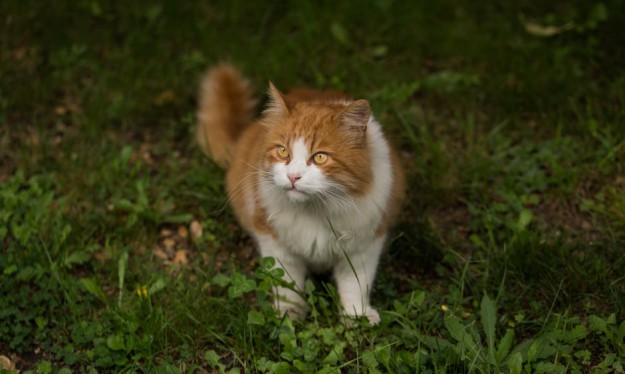Breed Information
| Popularity/Rank | 28 |
|---|---|
| Name | Somali |
| Other names | Fox Cat, Long-Haired Abyssinian |
| Origin | Somalia |
| Size | Small, Medium |
| Coat | Dense, Silky, Soft, Long Hair |
| Lap Cat | No |
| Lifespan | 12 to 16 years |
| Temperament |
Affectionate, Gentle, Intelligent, Interactive, Loyal, Tenacious, Mischievous 1. Affectionate: The Somali cat is an affectionate breed that loves to be around people. They are known for their gentle nature and loving personality. 2. Gentle: The Somali cat is a gentle breed that is known for its loving personality. They are affectionate cats that enjoy being around people. 3. Intelligent: The Somali cat is an intelligent breed that is known for its interactive and tenacious personality. They are loyal cats that enjoy being around people and love to play games. 4. Interactive: The Somali cat is an interactive breed that loves to be around people. They are known for their intelligent and mischievous nature. 5. Loyal: The Somali cat is a loyal breed that enjoys being around people. They are affectionate cats that love to play games and are very interactive. 6. Tenacious: The Somali cat is a tenacious breed that loves to be around people. They are known for their intelligent and mischievous nature |
| Weight | Female: 6 - 10 pounds, Male: 10 - 12 pounds |
| Colors | Black, Blue, Chocolate, Fawn, Red, Silver, Ruddy |
| Kitten Prices |
USD $1000 - $1500
Somali kittens are a hot commodity in the world of cats. They are known for their striking coats and beautiful features. Prices for Somali kittens can range from $1000 to $1500 depending on the breeder or the reputation of the breeder. Some factors that can affect the price of a Somali kitten include the quality of the kitten, the parents of the kitten, and whether or not the kitten is from a reputable breeder. When it comes to quality, Somali kittens from reputable breeders are going to be your best bet. These breeders have years of experience and know how to produce healthy, good-looking kittens. The parents of a Somali kitten can also affect its price. If the parents are show-quality cats, then their offspring will likely be more expensive than a kitten whose parents are not as impressive. Finally, where you purchase your Somali kitten can also affect its price tag. Buying from a well-known breeder will usually be more expensive than buying from a smaller operation. So, is it worth it to spend more money on a Somali kitten? That depends on what you're looking for in a cat. If you want a beautiful, healthy cat with an impressive pedigree, then spending more money on a high-quality Somali kitten is probably worth it to you. However, if you're just looking for a loving companion who happens to be a Somali, then you may be able to find what you're looking for without breaking the bank. |
Breed Characteristics
| Adaptability | |
|---|---|
| Affection Level | |
| Child Friendly | |
| Dog Friendly | |
| Energy Level | |
| Grooming | |
| Health Issues |
Feline infectious peritonitis, Feline leukemia, Feline immunodeficiency virus, Rabies, Ringworm Is Somali cat Hypoallergenic? There is no definitive answer to this question as everyone's allergies are different. However, Somali cats are considered to be relatively hypoallergenic as they produce less of the protein that is known to cause allergies in some people. If you are allergic to cats but would like to own one, it is recommended that you spend time around a Somali cat before making a commitment to see if you have a reaction. Feline infectious peritonitis (FIP) is a viral disease that affects cats. The disease is caused by a coronavirus, and it is typically fatal. Symptoms of FIP include fever, weight loss, appetite loss, and abdominal pain. There is no cure for FIP, and treatment is typically supportive. Feline leukemia is a viral disease that affects cats. The disease is caused by a retrovirus, and it can be fatal. Symptoms of feline leukemia include fever, weight loss, appetite loss, and lethargy. There is no cure for feline leukemia, but treatment is available to help manage the symptoms. Feline immunodeficiency virus (FIV) is a viral disease that affects cats. The disease is caused by a lentivirus, and it can be fatal. Symptoms of FIV include fever, weight loss, appetite loss, and lethargy. There is no cure for FIV, but treatment is available to help manage the symptoms. Rabies is a viral disease that affects mammals, including cats. The disease is typically fatal, and symptoms include fever, muscle weakness, paralysis, and seizures. There is no cure for rabies, and treatment is typically supportive. Ringworm is a fungal infection that affects the skin. The infection is typically not fatal, but it can cause hair loss and skin irritation. Treatment for ringworm typically includes antifungal medication. |
| Intelligence | |
| Shedding | |
| Social Needs | |
| Stranger Friendly | |
| Vocalization | |
| Health Care |
Somali cats are a relatively healthy breed, but like all cats, they are susceptible to certain health problems. Some of the most common health problems seen in Somalis include respiratory infections, eye problems, and gastrointestinal issues.
Somali cats are prone to respiratory infections due to their long, thin noses. These infections can be serious and even life-threatening, so it's important to take your Somali to the vet at the first sign of any respiratory symptoms. Eye problems are also common in Somalis, and can range from minor irritations to serious conditions that can cause blindness. Gastrointestinal issues are another common health problem in Somalis, and can include everything from diarrhea to vomiting. While Somali cats are generally healthy, it's important to be aware of the potential health problems they may face. If you have any concerns about your Somali's health, be sure to take them to the vet for a check-up. |
History
Somali cats are a relatively new breed, having only been around since the 1970s. They are a natural mutation of the Abyssinian breed, and are characterized by their long, lithe bodies and large, bushy tails. Somalis are also known for their striking coats, which feature alternating bands of light and dark fur.
The Somali breed nearly became extinct in the early days due to a lack of interest from cat fanciers. However, a small group of dedicated breeders kept the Somali alive and eventually managed to get the breed recognized by major cat registries. The Somali slowly began to gain popularity in the 1980s and 1990s, and today is considered one of the most popular Abyssinian variants.
The ancestry of the Somali cat is largely unknown. However, it is believed that the first Somalis were born in Somalia (hence the name) or Ethiopia, as this is where most Abyssinians originated from. It is also possible that some Siamese or other Oriental breeds were used in the development of the Somali, as these cats share many physical similarities with Somalis.
From where Somali cat recognized as a breed? The first official recognition of the Somali breed came from The International Cat Association (TICA) in 1979. Since then, Somalis have been gaining popularity among cat fanciers around the world and are now recognized by all major cat registries.
Description
The Somali cat is a beautiful, medium-sized cat with a long, thick coat. The coat is usually a light brown or red color, with darker brown or black markings on the face, legs, and tail. The Somali cat is also known for its large, bushy tail.
The Somali cat has a lifespan of 12-15 years. They are medium-sized cats, weighing 8-12 pounds. The Somali cat comes in a variety of colors, including red, brown, black, and silver.
The Somali cat is a very active and playful cat. They are very curious and love to explore their surroundings. They are also very social cats and enjoy being around people and other animals. Somalis are very affectionate cats and make great companions.
Somalis are generally friendly towards other cats, dogs, children, and other animals. However, they can be shy around strangers at first. Once they get to know you, they will be your best friend!
The Somali cat is an adaptable breed of cat that can adjust to almost any environment or situation. They are perfect for families with children or other pets because of their outgoing personality and love of socialization.





